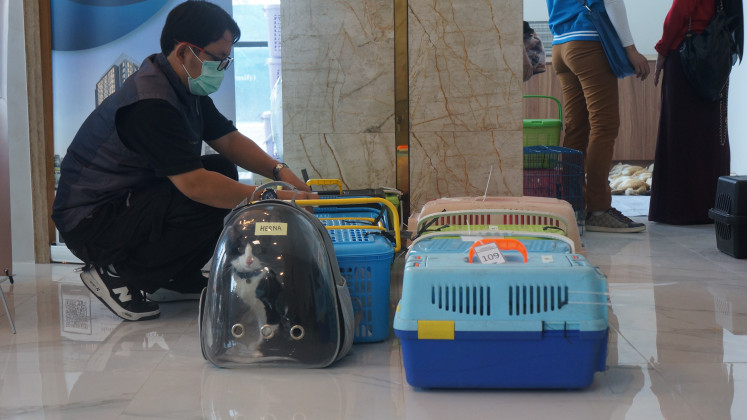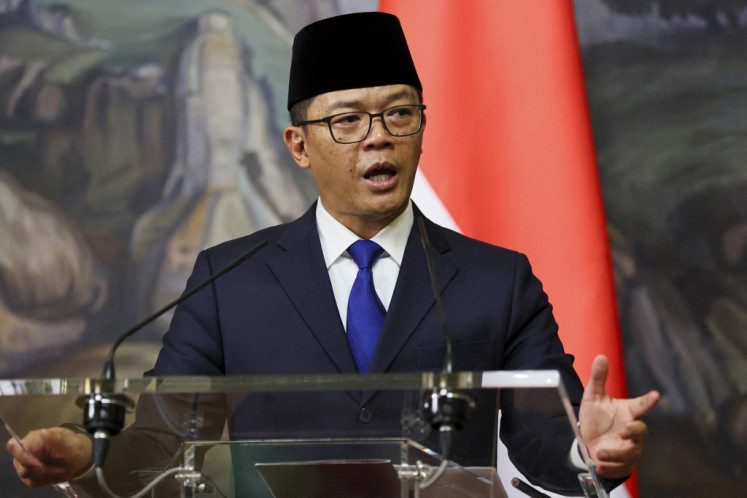Popular Reads
Top Results
Can't find what you're looking for?
View all search resultsPopular Reads
Top Results
Can't find what you're looking for?
View all search resultsOvercoming the lack of female leaders
Change text size
Gift Premium Articles
to Anyone
 Women comprise 65 percent of all online shoppers, yet the number of women in top management positions at 13 e-commerce companies stands at only 31 percent. (Shutterstock/File)
Women comprise 65 percent of all online shoppers, yet the number of women in top management positions at 13 e-commerce companies stands at only 31 percent. (Shutterstock/File)
There is a lack of equality between men and women in the workplace, especially higher up on the career leader.
According to data from the World Bank, women comprise 47 percent of entry-level professionals and the number decreases with middle and high-level management positions. Women make up 20 percent of mid-level management positions, and only 5 percent of CEOs and board members are women.
For managerial roles, women are the least represented in corporations. A recent study found that few women hold high-level managerial positions in e-commerce.
Women comprise 65 percent of all online shoppers, yet the number of women in top management positions at 13 e-commerce companies stands at only 31 percent. Only 36 percent of division heads in the industry are women, and the number is even lower for female CEOs and vice presidents at 21 percent.
The study found that the same phenomena applies across the region. There is a lack of women in the e-commerce industry in Singapore with a participation rate of 34 percent; the rate is 37 percent in Vietnam, 40 percent in Thailand and 42 percent in Malaysia. The Philippines has Southeast Asia's highest rate at 55 percent. Indonesia holds the lowest rate at 31 percent.
Indonesia is ranked 10th in the World Economics Forum's Gender Gap Index. This means that it is far behind other developing countries such as the Philippines, Vietnam and Thailand in gender equality.
Indonesia has great potential to increase its GDP to US$135 billion by 2025 if more women take on roles in productive sectors, according to McKinsey & Company.
But what are the factors that hold women back from corporate success? There are several challenges that we need to overcome:
Lack of support networks
A report from Grant Thornton International Business Report (IBR) states that there are several reasons that make it difficult for women to climb the career ladder, with the biggest constraints being motherhood (41 percent), family responsibilities (41 percent), non-supportive environments (31 percent) and gender discrimination (24 percent).
According to the managing partner of Grant Thornton Indonesia, Johanna Gani, there is a lack of female leadership because Indonesian culture is still strongly influenced by hierarchical structures and patriarchy. With this collective mindset, there is a belief that men should hold leadership roles as they are perceived to be more competent.
As reported by Tirto, 30 million Indonesian women have made the decision to not climb the career ladder. Sintesa Group CEO Shinta Kamdani said that there was a perception that having an expanded role would disrupt the balance between work life and home life.
As a result of these social norms, many Indonesian women are afraid to pursue certain high-level positions.
Lack of confidence
Another factor holding women back in the country is a lack of confidence. Women often undersell themselves and underestimate their potential, power and influence in the workplace. In contrast, men are typically quite confident in themselves and their capabilities.
A Bain & Company survey of over 1,000 women shows that women in middle management positions lack confidence in rising to the top. Male colleagues at the same level had access to same-sex mentors to help them to navigate these issues.
Mentoring and a supportive environment are keys
Empowering women has long-term positive socioeconomic impacts. Mentorship is a crucial component of career success, offering both mentor and mentee opportunities to learn and grow. With mentorship and training, women are able to tap into strengths that they may not have been aware of.
Women also require a supportive social environment that allows them to excel. Director of PT Marga Mandala Sakti Wiwiek Santoso said that women could not be expected to have all the responsibilities at home in terms of taking care of children and household affairs. Therefore, there is a need for cooperation with husbands to strike a balance between the workplace and home.
Women are also advised to be more proactive in empowering themselves by developing a broad range of skills, actively working on building their self-esteem and helping other women to grow – both personally and professionally.
A study by MSCI shows there is a positive correlation between the presence of women in corporate leadership and performance. Companies in the MSCI World Index with strong female leadership generated a return on equity of 10.1 percent per year versus 7.4 percent for those without women in leadership roles.
Considering the research concluded that gender diversity in high-level positions has significant benefits for both productivity and profits, Indonesian enterprises need to be more proactive in supporting gender diversity in management and board positions to optimize growth. (kes)
***
Indah Mustikasari is an observer-thinker who is passionate about human behavior. She works at Kuala Lumpur-based company iPrice.









